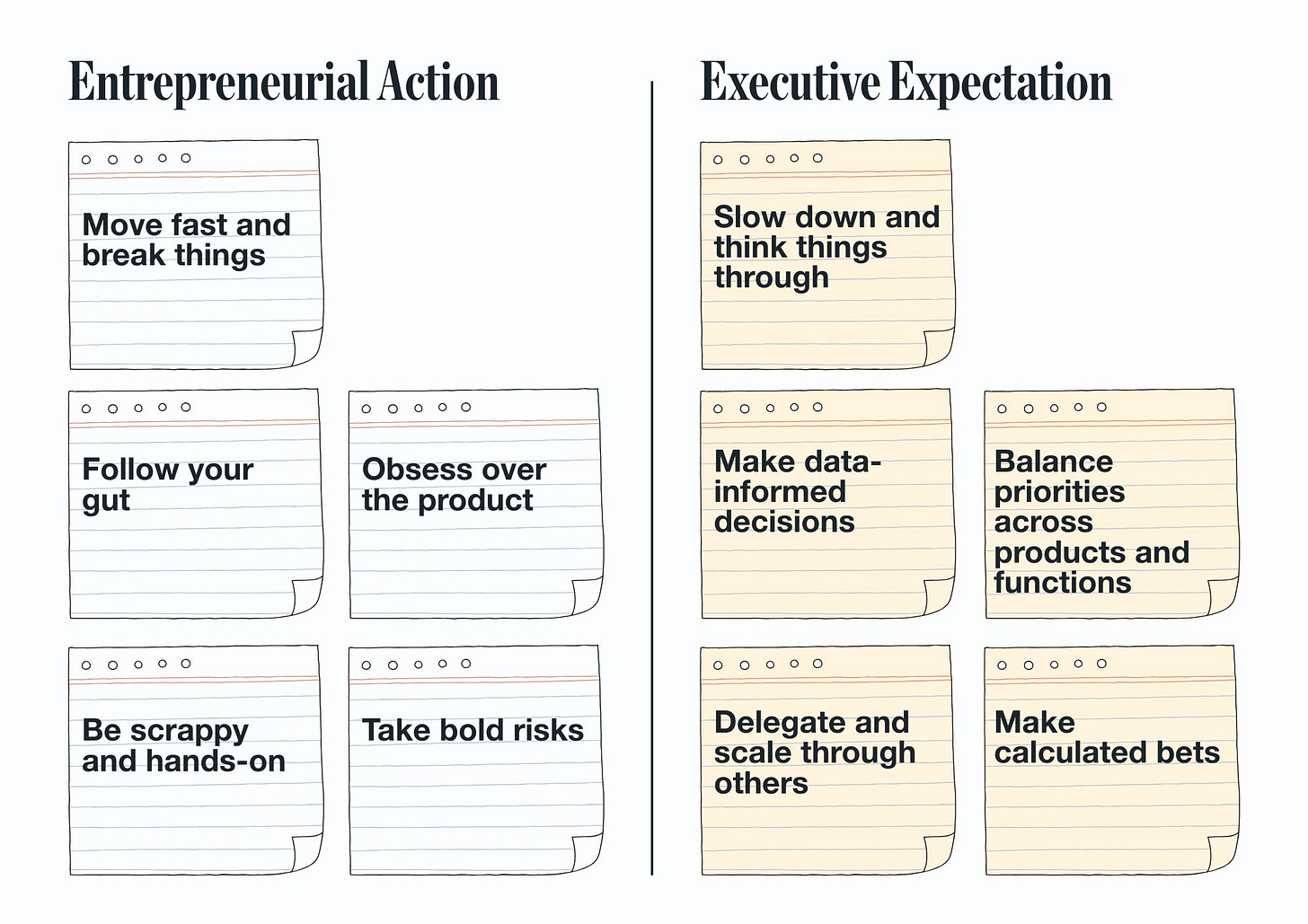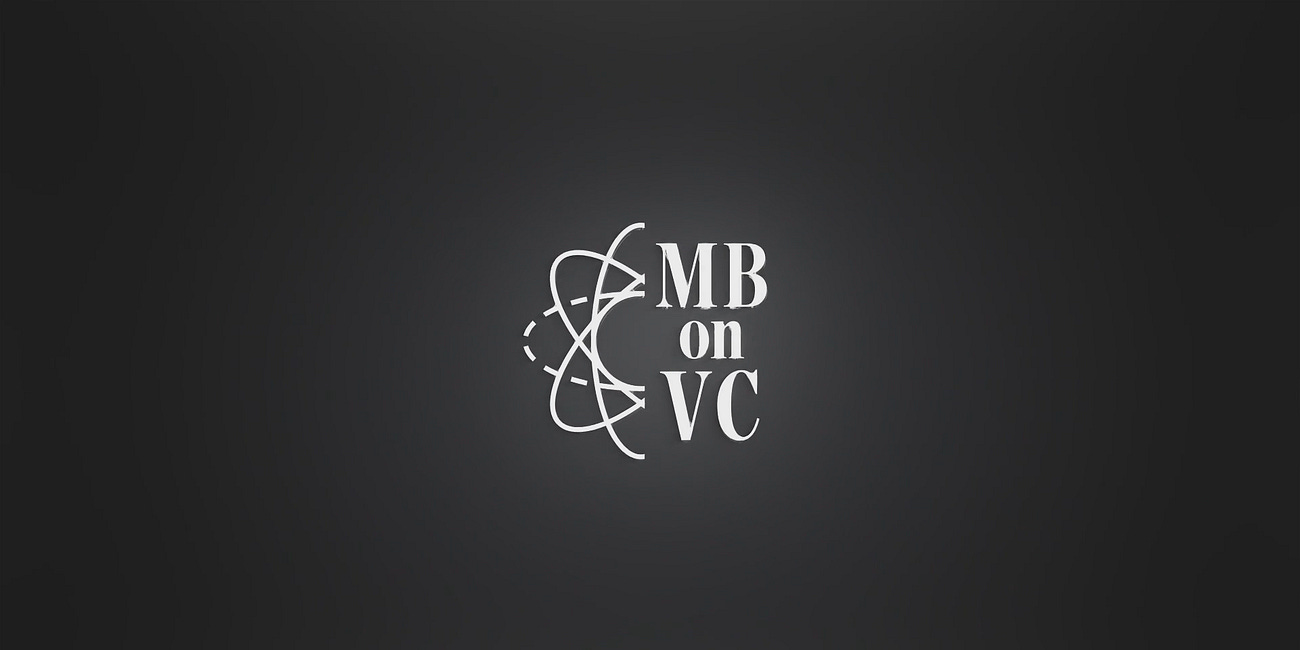From Visionary Founder to High-Performance CEO
Insight from decades of experience as an investor helping entrepreneurs evolve from gritty founder to visionary, strategic CEO.
The journey from bold entrepreneur to accomplished executive is one of the most transformative arcs in business. It’s a transition not simply of title, but of mindset, capabilities, and purpose. For many founders, the evolution means reshaping the DNA that drove them to become an entrepreneur. It means exchanging the risk-taking, disruption, and relentlessness that drove their early-stage success for a different kind of visionary leadership that is more appropriate to thriving in the structured, complex realm of executive leadership.
The Skills that Define Successful Entrepreneurs
Entrepreneurs often operate like the eye of a storm at the center of their startup. They have unmatched energy, their dream is big and clear, and their tolerance for ambiguity tends to be unusually high. The most successful and enduring founder-leaders in history, especially in disruptive industries, share a set of defining characteristics that include vision, a tolerance for risk and adversity, an exceptionally high level of resourcefulness, and pure magnetism.
Visionary Thinking
Category-defining companies don’t exist without visionary thinking. Exceptional founders possess a rare ability to spot patterns and possibilities others miss, or where others see problems and chaos. They are not confined by existing solutions or the present market, nor are they constrained by conventional thinking. They envision solutions and a different future, and, more importantly, they can reverse-engineer the path to those outcomes.
Risk Tolerance
Building a company from scratch takes being willing to work on a vision despite rampant uncertainty. The most resilient entrepreneurs know how to pair a rational appetite for risk with an ability to make decisive bets with incomplete information. They accept the inevitability of failures and volatility in the startup journey. What’s more, they’re willing and able to act boldly despite them, even or especially when others hesitate.
Resourcefulness
Startups are shaped by their constraints. Great founders treat limitations as fuel for creativity. They operate with relentless efficiency, working against scarcity and restrictions to extend the company’s runway, secure talent they need but often can’t afford, and unlock black boxes of growth. Every obstacle represents the potential for innovation, not an excuse to stall or quit.
Customer Obsession
Great founders tend to be as obsessed with the people who need what they are building as they are with the innovation itself. They don’t just listen to the market. They constantly ask, intuit, test, analyze, and anticipate. Driven by insight and inspiration, they resolutely strive to build and sell solutions that deliver real, repeatable value. Unafraid to pivot as customer needs and markets change, these founders often succeed in spaces where incumbents lose ground.
Resilience
Adversity is as much a part of an entrepreneur’s existence as the excitement of vision and discovery. What separates great founders is how they respond to challenges. Elite founders internalize feedback, extract insight from experiences, and recover from failure quickly.
Salesmanship
Besides being gifted idea people, great founders are able to inspire others to follow their lead. Long before a product or service is complete or the market is proven, founders can sell the story. While charisma may be involved, the ability to communicate future value with clarity and conviction is more important.
These traits are indispensable at launch. They create an allure that attracts team members, customers, and valuable attention.
The problem is that these traits rarely scale.
The founder can’t be the only one in the company who possesses these traits. Moreover, running a mature company requires a fundamentally different toolkit that prioritizes structure, strategies, and measurable outcomes.
The Required Traits of High-Performing CEOs
As the company evolves, the high-performing founder-CEO must mature as well. Without losing their purpose, charisma, risk tolerance, or force of will, they must also develop the capacity for orchestrating talent, culture, and systems. The larger organization demands a form of leadership that puts strategic foresight, operational systems, and a deep commitment to empowering others at the forefront. This version of the CEO role is less about doing everything and more about creating the conditions in which others can excel in key functions.
Strategic Clarity
Enduring companies emerge from inspiration and grow with a clear sense of direction. The founder-CEO articulated a compelling vision and must now deliver a pragmatic strategy that aligns near-term actions with long-term outcomes. Others look to them to set priorities, prompt decisions, and maintain focus as the company navigates growth.
Operational Discipline
Execution at scale requires usable systems built on metrics, processes, and accountability. Operational discipline becomes the infrastructure that allows the company to move faster, with more precision and fewer distractions.
Team Empowerment
Great leaders build great leaders. That means recruiting and hiring domain experts, trusting them to lead, and creating a culture of ownership and performance. Empowering a high-performing team involves clear expectations, consistent coaching, and a willingness to do whatever is necessary to remove obstacles for each person. Founder-CEOs who master this transition unlock exponential progress and impact through others.
Financial Acumen
For the rapidly growing company, capital efficiency becomes as important as growth. Even founder-CEOs who do not come from a financial background must become adept at capital allocation, cost discipline, balance sheet strategies, and more. This evolution is not about becoming a hybrid CEO-CFO, but rather about becoming a steward of the enterprise.
Stakeholder Management
As a company grows, so does its network of stakeholders. Employees, customers, investors, partners, and boards each bring value and expectations. The founder-CEO must build and nurture each one of these relationships honestly and diplomatically. Of course, each stakeholder group (and individual) has their own idea of success, but across them all, the leader should always maintain trust and manage expectations with consistency and integrity.
Emotional Intelligence
Ultimately, scalable leadership is about influence that comes from listening, empathy, self-regulation, and confidence. Successful startup executives tend to be gifted partners and communicators who recognize when to step forward or back and who are able to foster a culture where people feel seen, safe, and supported.
Growing as a leader as the company scales does not mean doing even more of everything. It’s about widening a skill set that attracts the right group of people into an environment that feels safe, organized, and directionally accurate, even as it is evolving.
Making the Transition from Founder-leader to Executive CEO
Early in the startup, founder instincts are essential. Even where playbooks exist, they’re only as useful as the startup is predictable (which is to say, minimally). Progress, traction, and scale hinge on the founder’s energy, urgency, and intuition. Many decisions happen in the absence of perfect data, instead informed by proximity to the product, market, customer, and operational details.
Over time, demands change. Old customers churn, and new ones emerge, the competitive moat gets shallower, institutional capital becomes necessary fuel, the team grows, product-market fit evolves, and external market forces emerge. Each of these inflection points requires different instincts and actions. For the founder, making the right next moves is not just a matter of doing more; it’s a matter of doing differently.
These strategic shifts are not uncommon. Ask any experienced entrepreneur, and it’s likely they will describe specific, repeatable patterns:
These are not trivial adjustments. Nor are they complete changes. These “yes, and” approaches reflect how the founder-leader must approach value creation as the business scales. For example, at the start, speed and resourcefulness matter most. In rapid growth, speed and resourcefulness still matter, but they must be informed by a higher level of focus and wider orchestration. Or in another example, a solo founder who once made every decision now guides outcomes by hiring and empowering others.
The central tension in founder evolution is learning how to preserve the strengths that sparked the business while developing the disciplines that will sustain it.
Resisting the shift is understandable. It’s familiar to rely on instinct, especially if it has resulted in success. It’s efficient (and can be comforting) to stay ‘in the weeds.’ But leaders who fail to grow with their company are eventually outgrown by it. Evolution is not abandoning what has worked. It’s expanding what’s possible. The evolution process may feel like a tug-of-war. In the two-plus decades of advising founders as they navigate these changes, I’ve seen some fundamental tactics that have worked well.
Surround Yourself with Balance: Hire operators who excel at the things that don’t energize you. Complement your vision with their ability to specialize and execute.
Redefine What Winning Looks Like: Shift the metric from enviable levels of hustle and innovation to how healthy and scalable the culture and outcomes are.
Invest in Self-Awareness: Executive coaching and 360-degree feedback from experienced specialists like the BIP Ventures Performance Engineering team can reveal blind spots and provide relevant, practical growth paths.
Separate Roles Temporarily: To create space to operate as visionary founder and strategic CEO, many strong entrepreneurs assign a COO to oversee and absorb day-to-day execution demands.
Honor Both Halves: Instead of suppressing your entrepreneurial fire, learn when, where, and with whom to ignite it.
Navigating the journey from founder to CEO doesn’t mean killing your inner entrepreneur. It means being self-aware and confident enough to engage it appropriately as the organization grows. The goal isn’t to replace the visionary dreamer with a tactical manager. It’s to evolve the dreamer into a builder who is capable of making a lasting impact.
Contact us to learn more about our process of partnering with capable, resilient founders – and the results it produces.
Mark Buffington is the co-founder and CEO of BIP Capital and the Managing Partner of BIP Ventures. Since launching BIP Capital almost 20 years ago, he has led the firm to become one of the most consistently active and recognized venture capital brands outside of Silicon Valley.
Under Mark’s leadership, BIP Ventures has established a reputation for delivering exceptional returns to investors, consistently outperforming public market equivalents and top-quartile Venture Capital benchmarks. (1)
With decades of experience as an entrepreneur and operator, Mark is deeply committed to helping founders and portfolio company leadership teams build category-leading companies and drive premium exit outcomes.
He has developed some of the industry’s most innovative platforms, including a private equity Evergreen BDC, a proprietary deep-data AI platform, and a Performance Engineering framework that drives repeatable, high-growth outcomes for founders. The results of these efforts speak for themselves. Founders who partner with Mark and the BIP Ventures team achieve more life-changing outcomes than when they work with other VCs. Across six vintages of funds, more than 60% of capital invested has returned gains, and over half of all investments have achieved a 3x return or better. (2)
Since 2006, Mark has led investments in more than 150 companies spanning growth stages and sectors, including Healthcare Tech, Digital Media, EdTech, Enterprise SaaS, FinTech, and Advanced Computing. Notable investments include Vendormate, Ingenious Med, QA Symphony/Tricentis, PlayOn, Huddle Tickets, Tropical Smoothie Cafe, Cypress.io, ConnexPay, REACH Health, Trella Health, Shareholder InSite, ChartSpan and Aspirion Health Resources. (3)
Mark holds an MBA from Tulane University’s A.B. Freeman School of Business and a B.S. from the Georgia Institute of Technology, where he was also a varsity letterman in baseball. He serves on the boards of several companies, including NFHS Network, Rhyme, ShiftMed, AchieveIt, Trella Health, PlayOn, ChartSpan, and the BIP Advisor Acquisition Fund. He is also active on several nonprofit boards, including the Buckhead Coalition and the Metro Atlanta Chamber Executive Board.
Connect with Mark on LinkedIn.
Go Deeper:
In Venture Capital, Grit Beats Glamour
In my experience, I have seen a logical, predictable relationship between intrinsic motivation, grit, and entrepreneurial performance. The logical flow goes like this: teams that are more purpose-driven are grittier, and grittier teams take on and solve more problems than teams that are deterred by challenges. And that constant focus on problem-solving …




